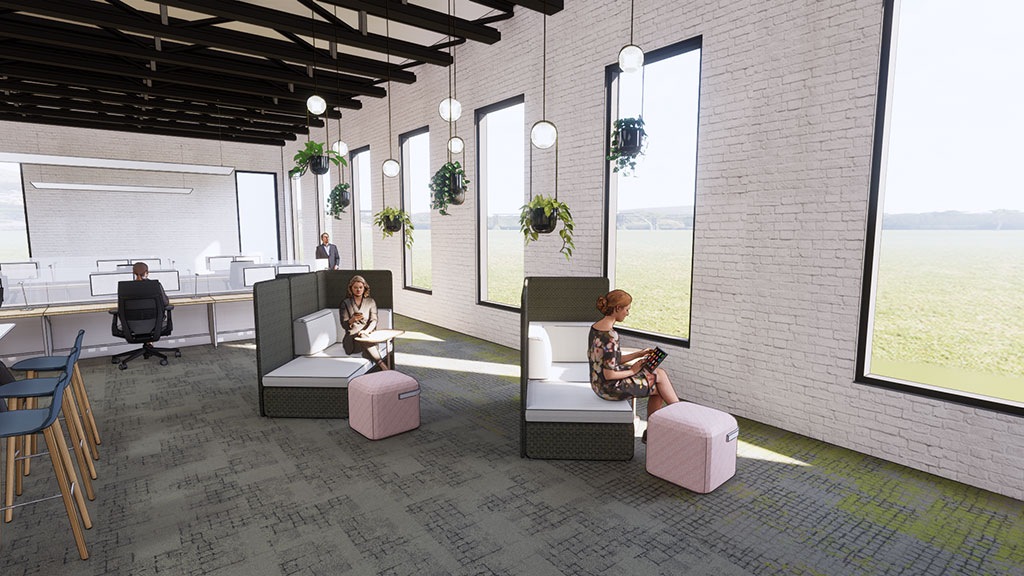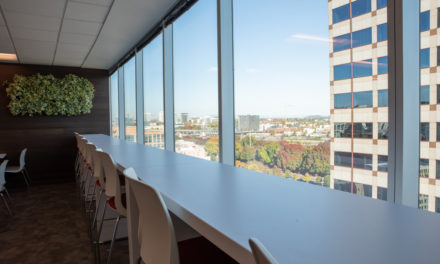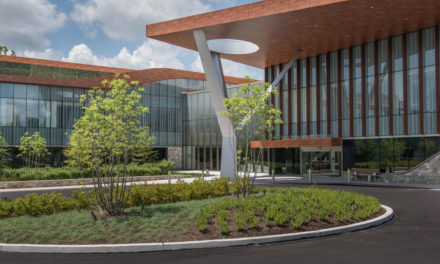Stantec announced last month that is supporting a company-sponsored biophilic design research through the Healthy Building Program at the Harvard T.H. Chan School of Public Health. Biophilic design is a strategic approach to incorporate nature into the built environment. The research shows that biophilic design can improve holistic wellness and key cognitive functions, boosting key critical business metrics. The research was sponsored through Stantec’s Creativity & Innovation (C&I) program, which celebrates and encourages creative and innovative thinking that benefits clients and communities.
While biophilic design elements such as positive indoor air quality, ventilation, and access to daylight have all proven to benefit physical health, data linking biophilic design directly to human performance was previously limited.

Heather Greene, senior associate and workplace leader at Stantec.
“In a global world that has paused, the health and wellbeing of staff continues to be a priority,” said Heather Greene, senior associate and workplace leader at Stantec. “While some employees will continue to work from home for the foreseeable future, this research challenges us to put employees first when designing for those returning to the workplace. Employee wellbeing is no longer a luxury—it needs to be the norm.”
This study measured blood pressure, heart rate, heart rate variability, and skin conductance level (the body’s reaction to stress) while cognitive tests were administered to measure participants’ reaction time and creativity. Participants in the spaces with biophilic elements had consistently lower physiological stress indicators, as well as higher creativity scores. The results suggest that biophilic interventions can help reduce stress and improve creativity.
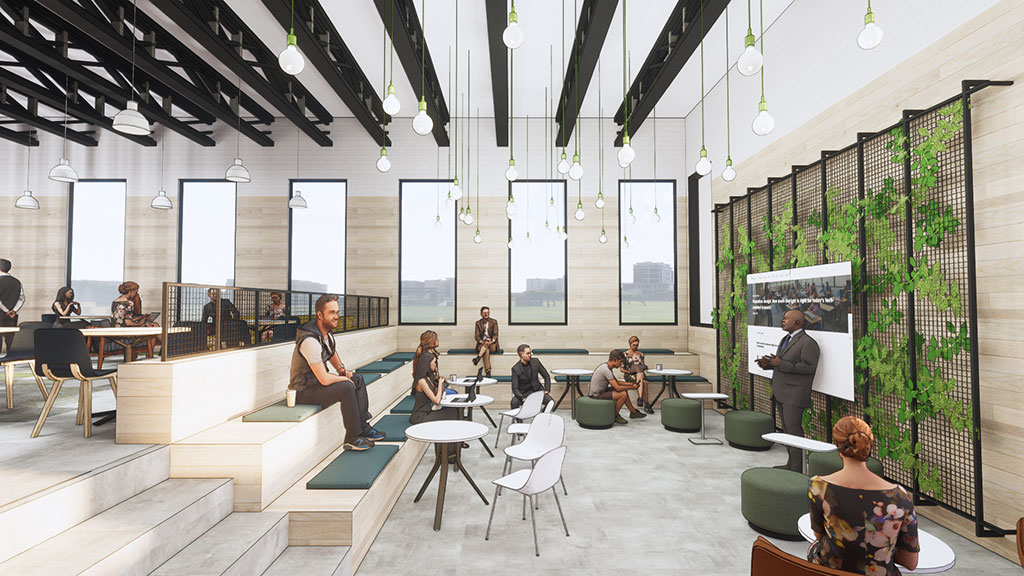
Courtesy of Stantec
Improving the workplace blues
Depression and anxiety disorders cost the global economy $1 trillion in lost productivity each year, according to the World Health Organization.
“By putting people first, we can tailor biophilic design to help employees reach their full potential,” said Greene. “When we focus on the biophilic patterns and their impact on promoting positive physiological and cognitive health, we unlock a new world of design that includes designing for the entire person.”
The current landscape has shifted how, when, and where employees work. It has also proven that remote work is possible on a much larger scale than most anticipated.
“When people return to the workplace, they will be doing so with an understanding that the physical space will be safe and supportive of their holistic wellbeing,” said Greene. “Prioritizing health and wellness in design is critical to teams reaching their full potential and maintaining a high level of engagement.”
Biophilic design in the workplace can include natural light, indoor plants, and natural materials amongst other design elements.
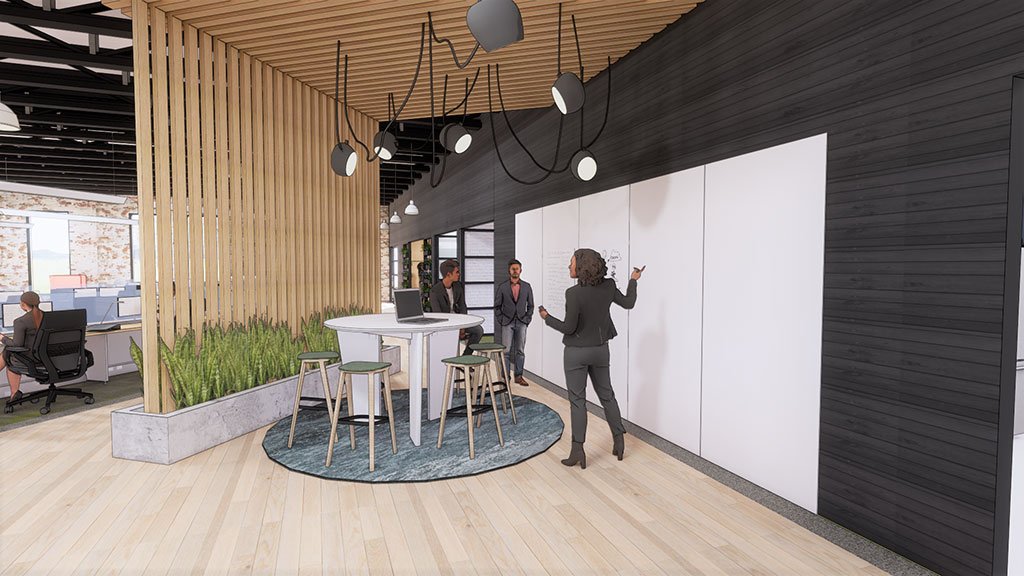
Courtesy of Stantec
Studied in a virtual reality lab
Harvard researchers designed and implemented a randomized crossover study that allowed participants to experience different versions and levels of biophilic design in open and closed office spaces within a Virtual Reality (VR) lab. Stantec design teams leveraged knowledge of biophilic patterns to integrate and layer the patterns into the space to meet study requirements, utilizing real-life solutions that could be implemented in the future.
Through the VR lab, researchers captured participants’ physiological stress measurements while completing cognitive tests to measure their reaction time and creativity. Eye tracking data showed that participants spent most of their time looking at biophilic elements, specifically green plants and biomorphic shapes and patterns. Demographics also played a role as participants raised in rural and suburban areas spent more time looking at biophilic elements in the space than their urban counterparts.
The results showed that biophilic design had consistent positive impacts on participants’ physiological stress measurements across all spaces. The biggest reductions in blood pressures and heart rate occurred when natural elements were present, specifically in the open office spaces.
For more information on the study and how biophilic design principals can be used to communicate social distancing and other safety changes workplaces are making, read the accompanying blog post by Greene at stantec.com.
The Harvard T.H. Chan School of Public Health study was among the top 10 percent of downloaded papers in Indoor Air, the International Journal of Indoor Environment and Health, 2018 – 2019. Download the full study here.
Stantec’s company funded research stream
Over the course of 14 years, Stantec’s C&I program has collectively awarded more than $13.1 million in pledged grants through 315 projects being carried out by employees, many of which are focused on solving challenges within our communities. Stantec’s C&I program helps the company live its values and deliver on its promise to design with community in mind.
About Stantec
Communities are fundamental. Whether around the corner or across the globe, they provide a foundation, a sense of place and of belonging. That’s why at Stantec, we always design with community in mind.
We’re designers, engineers, scientists, and project managers, innovating together at the intersection of community, creativity, and client relationships. Balancing these priorities results in projects that advance the quality of life in communities across the globe.
Stantec trades on the TSX and the NYSE under the symbol STN. Visit us at stantec.com or find us on social media.
For more information about Stantec’s response to COVID-19, visit Responding to COVID–19.

